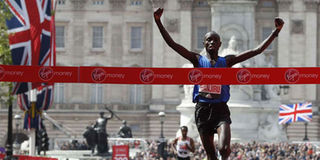Kenyan marathon star handed four-year ban for doping

Kenya's Daniel Wanjiru wins the Men's elite race at the London Marathon on April 23, 2017 in London.
What you need to know:
- Wanjiru, 28, was provisionally suspended in April for "use of a prohibited substance/method" after "abnormalities" were found in his biological passport.
- The suspension has been backdated to start from December 9 last year.
The 2017 London Marathon champion Kenya's Daniel Wanjiru has been banned four years after being found guilty of doping.
The Athletes Integrity Unit (AIU) had provisionally suspended Wanjiru on April 14 this year after anomalies were discovered in his Athlete Biological Passport under the World Athletics Anti-Doping Rules.
The Disciplinary Tribunal announced on Wednesday that the 28-year-old Wanjiru’s ban takes effect from December 9, 2019 hence all of his results from March 2019 have been rendered invalid.
The results include his bronze medal victory at Vitality Big Half Marathon in London in March, his 11th placing at London Marathon in April and 11th placing at the Kenya Police Championships in July.
Wanjiru shot to the limelight when he edged out Ethiopian long-distance running legend Kenenisa Bekele to London Marathon victory in 2017 before finishing eighth in the 2017 London World Championships.
A total of 16 blood samples were taken from Wanjiru between April 20, 2017 and April 29, 2019 of which blood sample 14 was taken on March 9, 2019, a day he flew to London.
He competed in the London Half Marathon (Vitality Big Half) on March 10, 2019 and returned to altitude on March 11, 2019. Sample 15 was taken on March 13, 2019.
The athlete’s ABP was submitted to a panel of three qualified and experienced experts for anonymous review, Doctor Laura Garvican Lewis, Professor Giuseppe d’Onofrio and Doctor Paulo Paixao.
The expert panel noted the abnormalities in sample 14 and rejected the possibility that the athlete’s travel from altitude to sea level could explain the variation in his hematological profile.
‘Besides the violation of ABP individual haemoglobin (HB) and off score limit, the HB value recorded in the sample 14 (19.4 g/l) is extra-ordinary high for a healthy young man. In this context, the extreme, abrupt and transitory increase of HB from 17.4 in sample 13 to 19.4 g/l in sample 14 does not have pathological explanation.
“Even in the case, a change of this inordinate rapidity and amplitude, and in such direction has neither any physiological explanation, the absence of a severe and certified medical condition associated with loss of a large amount of blood,” said the experts while presenting their evidence to the tribunal.
Nine Kenyans have been suspended for various doping offences in just four months of which two have won the London Marathon. Wilson Kipsang, who won in London in 2012 and 2014, was handed a four-year ban in June for whereabouts violation and presenting false evidence.
Wanjuru’s ban comes three weeks after another long distance runner Patrick Siele, who finished 12th at Venloop Half Marathon in the Netherlands and ninth at Cardiff Half Marathon in Great Britain last year, was banned for three years and six weeks.
Another Kenya’s long distance runner Philip Kangogo had also weeks earlier been handed a two-year suspension.
Siele and Kangogo join the long list of Kenyan athletes who have been banned for a period ranging from two years to eight years for violating the whereabouts rule or taking prohibited substances this year.
Mercy Kibarus got an eight years ban from September 2019 for presence of a prohibited substance as long distance runners Kenneth Kipkemoi and Alex Oliotiptip got two years each for substance abuse and whereabouts failure respectively.
Others who have been handed four years ban each are Mikel Kiprotich Mutai, Vincent Kipsegechi Yator and Peter Kwemoi after taking prohibited substances.
There are cases still pending this year including that of 2017 World 1,500m champion Elijah Manang’oi, 2014 World Under-20 800m champion Alfred Kipketer, and James Kibet.




